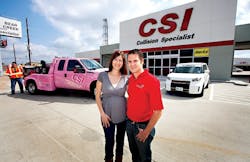Last November, an unlikely occurrence befell Trey and Cheryl Perdue’s body shop. Someone momentarily mistook a gas pedal for a brake and, as a result, plowed through the lobby of CSI Collision Specialist, in Houston.
They could’ve thought, ‘Here we go again.’ Instead, Cheryl says, she simply took a deep breath when she learned no one was in the lobby at the time of the accident.
“You’re upset, but I felt relief that no one was in there,” recalls Cheryl, who co-owns the facility with her husband. “Because the other things can be fixed.”
That, above all else, is the key to recovering from disaster as a shop owner: keep your cool. And Perdue is no stranger to dealing with disasters. She experienced that back in 2008, for instance, when the Category 4 winds of Hurricane Ike left her body shop in tatters, which was chronicled in a past FenderBender article.
“It was impactful, because [parts of] our building literally came down,” Perdue recalls, in reference to a portion of the shop’s bay area. “The winds of the hurricane just took it down. Boom. It’s a little chaotic—it just causes stress.”
But CSI Collision Specialist was rebuilt, and the 28,000-square-foot facility now features elements like a lobby that's the envy of many competitors. And, the lessons learned back in 2008 served the Houston shop well in recent years, when subsequent storms like Hurricane Harvey (in 2017) struck the area.
Here are Perdue’s suggestions for preparing a shop for such severe weather.
Create an emergency SOP.
While the majority of Houston businesses were closed at length in the wake of Hurricane Ike, the Perdues’ facility largely reopened roughly 72 hours after 110 mph winds battered their area. That’s because Trey Perdue thought ahead, taking steps like purchasing generators to quickly bring the business back to life.
“My husband went at it, because people still expect to have their cars,” Cheryl Perdue notes. “I mean, that’s how people get to work. People expect their cars no matter what.”
Now, when a major weather event appears poised to hit southeast Texas, staff members at the Perdues’ shop take cautionary measures like turning the business’ gas off, securing vehicles inside, cleaning up any cardboard at the facility, and making sure the shop floor’s drains are clear of debris like trash or even auto parts.
“Have standards for how you’re going to prep the building, to make sure it’s sound,” Perdue suggests.
Document everything.
Fortunately for the Perdues, their business had insurance that protected it in the event of wind storms. And, the co-owners also helped their cause by taking photos of their building and all items of value once Ike struck. After all, when insurers do a visual inspection of businesses following disasters, they demand such documentation.
“Nowadays it’s easier than in 2008, because you have smartphones now,” Cheryl Perdue notes. “So, you can just hit ‘record’ and quickly record a video of your business. It’s just easier to send a quick video. Then you don’t have to dig through a bunch of paperwork.”
For example, “if you bought generators, if you want to get paid back for that you’re going to have to be able to produce receipts, so keep your receipts.”
Schedule vehicle repairs carefully.
In the wake of storms, Perdue notes, a body shop’s schedule can become chaotic in the blink of an eye. That’s why, when Houston has been struck by subsequent storms in recent years, the staff at CSI Collision Specialist has worked hard to plan repair work with great care and an eye toward ideal shop floor workflow.
“After a hurricane you’re going to have lots of cars out,” Perdue says, “so, if a car’s driveable, you’re not encouraging people to drop off when there’s customers who are in wrecks that don’t have driveable cars. You’re just trying to schedule things appropriately, because there’s no sense in having someone drop off a car that they can still drive if there’s not a rental car available for them.”

